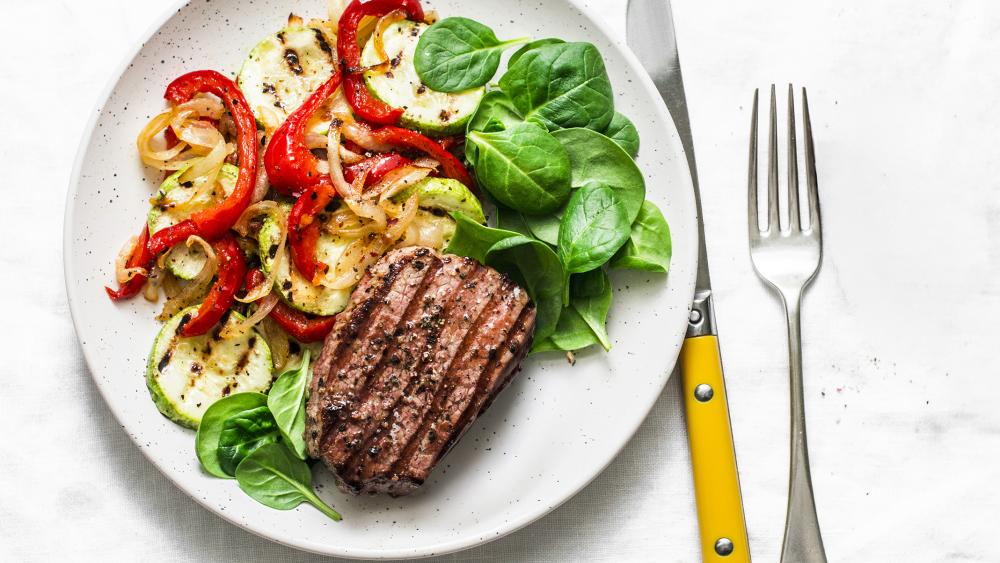Can lean beef be part of a healthy diet?
When participants ate .5 or 2.5 ounces of lean beef as part of a Mediterranean diet, they had lower blood levels of TMAO than when they ate the American diet, according to the results of the study. When participants ate the American diet with 2.5 ounces of non-lean beef daily or the Mediterranean diet with 5.5 ounces of lean beef daily, their TMAO levels were not different. These findings suggest dietary quality was more important than the amount of beef eaten, the researchers said.
“We chose 2.5 ounces of lean beef because that approximates the amount of beef that the average American consumes each day,” said Zachary DiMattia, doctoral candidate in nutritional sciences and lead author of this study. “This study suggests that, in the context of a healthy dietary pattern, people may be able to include similar amounts of lean beef without increasing their TMAO levels. If people eat reasonable portions of lean, unprocessed beef as part of a Mediterranean-style diet, we would not expect this specific marker of cardiovascular disease risk to rise.”
In addition to TMAO levels, the researchers examined how the different diets affected the diversity of participants’ gut microbiomes. Results indicated that all three Mediterranean diets increased gut microbiome diversity compared to the American diet.
The researchers said that further research is needed to understand the role the gut microbiome plays in the relationship between diet and TMAO levels. They agreed, however, that this study has implications for individuals who want to eat a healthy diet.
“Lean, moderately sized, unprocessed cuts of beef can be included as part of a healthy diet when people are consuming plenty of fruits, vegetables and healthy fats like olive oil,” DiMattia said.
More dietary impacts of lean beef
This study focused on TMAO levels, but Petersen’s laboratory group previously explored other health effects of adding lean beef to a Mediterranean diet.
In a study from earlier this year using the same data, the researchers examined how beef consumption affected the blood vessel health. The researchers found that a Mediterranean diet with lean beef resulted in lower blood pressure than when participants consumed an American diet.
Additionally, doctoral student Fatemeh Jafari led a review of previous studies that examined whether red meat consumption raised TMAO levels. The literature review highlighted the complicated nature of TMAO, Petersen said. Just under half of the studies found that red meat increased TMAO, while the rest showed no increase in TMAO associated with beef consumption.
Healthy eating is essential
The most important way to reduce risk, according to the researchers, is to establish healthy eating habits. They said that by consuming more vegetables, fruits and whole grains and reducing saturated fats, people can reduce their risk of heart disease. They also cautioned against taking these results out of context.
“This evidence does not mean you can necessarily eat a week’s worth of beef — for example, a single, 17.5-ounce steak — at one time and see the same results,” Petersen said. “Additionally, this recommendation does not extend to non-lean beef or processed meats like sausage or salami. Finally, these studies were conducted in relatively young, healthy individuals, so further research is needed in older people or anyone with elevated heart disease risk.”
Jingcheng Zhao, postdoctoral researcher in nutritional sciences; Fuhua Hao, assistant research professor of veterinary and biomedical sciences ; Sergei Koshkin, assistant research professor at the Penn State Huck Institute of Life Sciences; Jordan Bisanz, assistant professor of biochemistry and molecular biology and Dorothy Foehr and J. Lloyd Huck Early Career Chair in Host-Microbiome Interactions; Andrew Patterson, professor of molecular toxicology and of biochemistry and molecular biology; Jennifer Fleming, associate teaching professor of nutritional sciences; and Penny Kris Etherton, retired Evan Pugh University Professor of Nutritional Sciences, contributed to this research.
This research was funded by the National Cattlemen’s Beef Association — a contractor to the Beef Checkoff — and Penn State.


Dining and Cooking